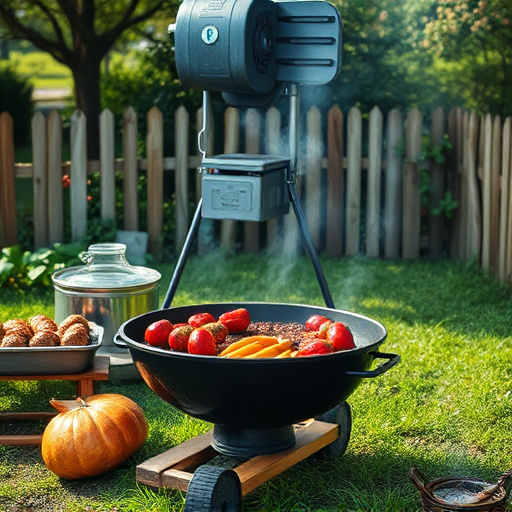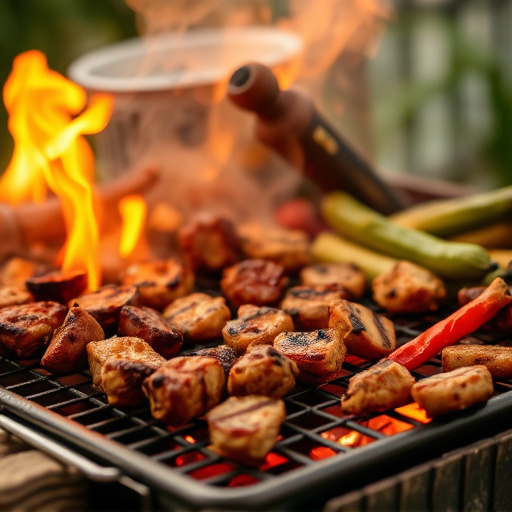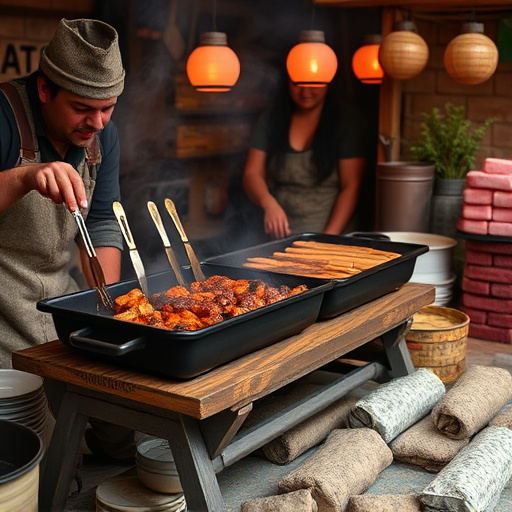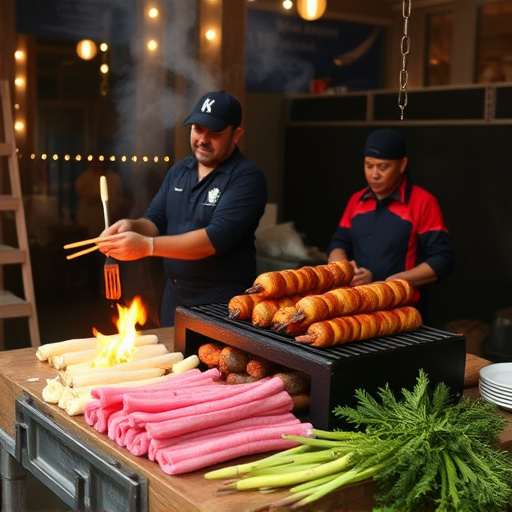Choosing the right chicken pieces (breasts, thighs, or bone-in with skin) for your BBQ marinade is key for tender, flavorful results. Marinades soften meat and infuse flavor through acids (lemon juice, vinegar) and enzymes (pineapple, kiwi). Balancing sweet, smoky, and tangy flavors in your marinade ensures juicy, tender chicken when grilled. A 1:2 acid-base ratio, scoring the chicken, and massaging the marinade in enhance absorption. Grill at medium-high heat for 5-7 minutes per side until internal temp reaches 165°F (74°C). Customize recipes with various cuts, serving options, spices like thyme, rosemary, and chili powder.
Looking for the perfect BBQ chicken marinade recipe to transform your meals? This comprehensive guide delves into the art of marinating chicken, ensuring tender, flavorful results. Learn how to choose the ideal chicken cuts and understand the science behind marinades. Discover essential ingredients, master the acid-base balance, and explore techniques for maximum penetration. From cooking tips to customizable variations, elevate your BBQ game with this expert advice on achieving juicy, delicious BBQ chicken every time.
- Choosing the Right Chicken for Marination
- The Science Behind Marinades and Their Effect on Meat Tenderness
- Essential Ingredients for a Flavorful BBQ Chicken Marinade
- Creating a Balanced Acid-Base Ratio in Your Marinade
- Techniques for Effective Marinade Penetration
- Tips for Cooking Marinated Chicken Perfectly
- Variations and Customization Ideas for Your BBQ Chicken Marinade
Choosing the Right Chicken for Marination

When it comes to creating a mouthwatering BBQ chicken marinade recipe, selecting the perfect chicken pieces is just as important as the marinade itself. Opt for high-quality, fresh chicken breasts or thighs with minimal fat content. This ensures that your marinade penetrates evenly, resulting in incredibly tender and juicy meat. Look for chicken cuts that are uniform in size to ensure even cooking, allowing each piece to marinate thoroughly and cook consistently.
The right choice of chicken will enhance the overall flavor infusion from the BBQ marinade. Chicken with a bit of bone-in and skin can add extra depth of flavor as the fat renders during the marination process. This creates a richer, more robust taste that’s characteristic of slow-cooked, BBQ favorites. So, whether you’re using boneless, skinless chicken breasts or bone-in thighs, selecting the right cut is key to achieving tender, flavorful results in your BBQ chicken marinade recipe.
The Science Behind Marinades and Their Effect on Meat Tenderness

Marinades have been used for centuries as a way to tenderize and infuse flavor into meat. The science behind marinades lies in their ability to break down the muscle fibers in meat through acidification and enzymatic reactions. Acids, such as those found in lemon juice, vinegar, or yogurt, soften the collagen and protein in the meat, making it more tender. Additionally, enzymes present in certain ingredients like pineapple or kiwi can further enhance this process.
When marinating chicken pieces for BBQ, the acid in the marinade reacts with the proteins in the meat, helping to break them down and making the chicken more susceptible to the flavor penetration. This process is crucial for creating a rich and flavorful bbq chicken marinade recipe that results in tender, juicy pieces of chicken ready for your grill.
Essential Ingredients for a Flavorful BBQ Chicken Marinade

When crafting a rich barbecue marinade for tender chicken pieces, understanding the essential ingredients is key. A good BBQ chicken marinade recipe should balance sweet, smoky, and tangy flavors. At the heart of this combination are often braisy liquids like soy sauce or teriyaki, which help penetrate the meat’s fibers, alongside agave nectar or brown sugar to enhance the caramelization process for that distinctive barbecue glow.
For a robust aroma, garlic, onion, and various spices such as paprika, peppercorns, and chili powder are essential. These not only add depth but also contribute to the marinade’s antimicrobial properties, ensuring your chicken stays fresh. Don’t forget the acid—vinegar or citrus juices—which not only cuts through fat but also helps break down protein, making your chicken incredibly tender with each grill session.
Creating a Balanced Acid-Base Ratio in Your Marinade

Creating a balanced acid-base ratio in your BBQ chicken marinade recipe is key to achieving tender, juicy results. Acids like lemon juice, apple cider vinegar, or buttermilk help break down proteins, making the chicken more tender. Bases such as olive oil or melted butter provide moisture and flavor. The ideal ratio is about 1 part acid to 2 parts base; this ensures the chicken marines evenly without becoming too sour or greasy.
Experimenting with different combinations of acids and bases allows you to tailor the marinade to your taste preferences. For a richer, creamier marinade, use more butter; for a tangier flavor, increase lemon juice or vinegar. Remember, the longer the chicken marinades, the more pronounced the flavors will be. So, adjust the ratios accordingly based on the desired intensity and the time you have available.
Techniques for Effective Marinade Penetration

To ensure your BBQ chicken marinade recipe is truly effective, it’s crucial to understand how to maximize marinade penetration. One key technique is to score the chicken pieces lightly with a sharp knife before marinating. This creates tiny gaps in the meat’s surface area, allowing the flavorful marinade to penetrate deeper and coat each piece evenly. Additionally, massaging the marinade into the chicken helps break down muscle fibers, resulting in tenderer meat.
Another important step is to allow enough time for marination—ideally 2-4 hours, or even overnight for more intense flavors. The longer the chicken soaks in the marinade, the more thoroughly it will absorb the delicious spices and acids. When ready to cook, ensure your grill is hot to promote browning and searing of the exterior while locking in that tantalizing BBQ chicken marinade recipe goodness inside.
Tips for Cooking Marinated Chicken Perfectly

When cooking marinated chicken, timing is key. Allow the chicken to sit in the marinade for at least 30 minutes, or up to a few hours if possible, to ensure maximum flavor absorption. This step is especially important for tougher cuts, as it helps to break down some of the muscle fibers and make the chicken more tender.
For perfectly cooked marinated bbq chicken, preheat your grill to a medium-high heat. This will help sear the exterior of the chicken pieces, creating a delicious crust while ensuring the interior remains moist and tender. Grill the chicken for around 5-7 minutes on each side, or until it reaches an internal temperature of 165°F (74°C). Using a good quality bbq chicken marinade recipe will not only enhance the taste but also act as a natural tenderizer, making your grilled chicken melt-in-your-mouth delicious.
Variations and Customization Ideas for Your BBQ Chicken Marinade

When it comes to crafting your perfect BBQ chicken marinade, there’s no one-size-fits-all formula. The beauty lies in its versatility – feel free to experiment with different ingredients based on personal preference and available flavors. For instance, if you’re a fan of sweet and smoky profiles, consider adding a touch of barbecue sauce, honey, or molasses alongside your base of oil, vinegar, and spices. A dash of heat? Include chili powder, cayenne pepper, or your preferred chili flakes. Herbs like thyme, rosemary, or oregano can impart earthy nuances, while garlic and onion offer a pungent kick.
Customization is key to creating a marinade that aligns with your taste buds. Think about the cut of chicken – thicker pieces may benefit from a longer marination time for deep penetration of flavors. Consider serving options too; if you’re aiming for a saucy BBQ experience, increase the liquid content and adjust seasoning accordingly. Don’t be afraid to test as you go, adjusting the acidity, sweetness, or heat level until it’s just right for your bbq chicken marinade recipe.
